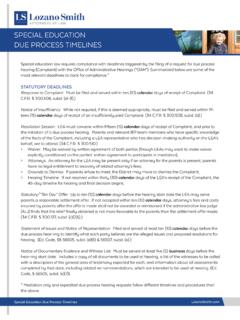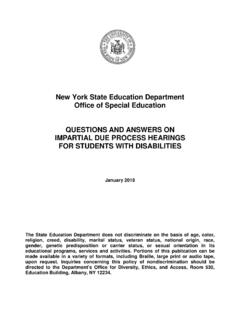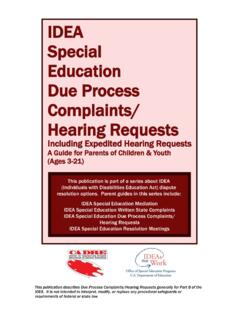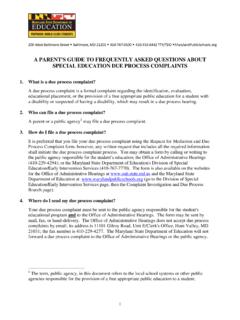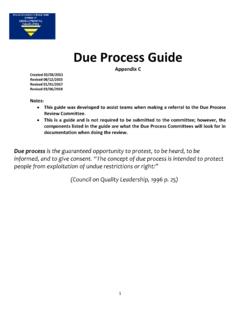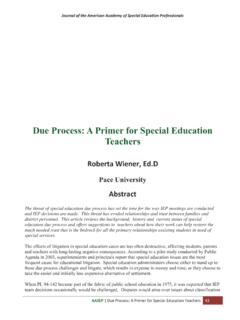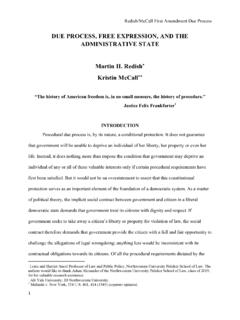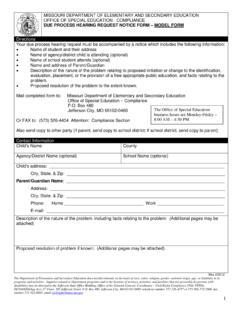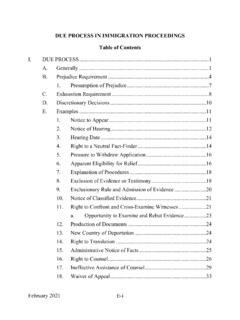Transcription of FIRE’s GUIDE TO DUE PROCESS AND FAIR PROCEDURE ON …
1 FIRE's GUIDE TO. DUE PROCESS AND. FAIR PROCEDURE . ON CAMPUS. FIRE's GUIDES TO. STUDENT RIGHTS ON CAMPUS. FIRE's GUIDE to Religious Liberty on Campus FIRE's GUIDE to Student Fees, Funding, and Legal Equality on Campus FIRE's GUIDE to Due PROCESS and Fair PROCEDURE on Campus FIRE's GUIDE to Free Speech on Campus FIRE's GUIDE to First-Year Orientation and to Thought Reform on Campus FIRE. Alan Charles Kors Harvey A. Silverglate Codirector Codirector Thor L. Halvorssen Chief Executive Officer Erich Wasserman Executive Director BOARD OF EDITORS. Vivian Berger Edwin Meese III. T. Kenneth Cribb, Jr. Roger Pilon Alan Dershowitz Jamin Raskin Paul McMasters Nadine Strossen FIRE's GUIDE TO. DUE PROCESS AND. FAIR PROCEDURE . ON CAMPUS. Harvey A. Silverglate Josh Gewolb F OUNDATION FOR I NDIVIDUAL R IGHTS IN E DUCATION.
2 Philadelphia FIRE's Know Your Rights Program and FIRE's Guides to Student Rights on Campus are made possible by grants from The Achelis Foundation, The Joseph Harrison Jackson Foundation, and Earhart Foundation. The Founda- tion for Individual Rights in Education gratefully acknowledges their support. Copyright 2003 by the Foundation for Individual Rights in Education All rights reserved. No part of this publication may be reproduced or trans- mitted in any form or by any means, electronic or mechanical, including photocopy, or any information storage and retrieval system now known or to be invented, without permission in writing from the publisher, except by a reviewer who wishes to quote brief passages in connection with a review written for inclusion in a magazine, newspaper, or broadcast. FIRE invites and welcomes requests for reproduction and retransmission of this publication.
3 Contact: FIRE's GUIDE to due PROCESS and fair PROCEDURE on campus / Harvey A. Silverglate & Josh Gewolb. p. cm. ISBN 0-9724712-2-7 (alk. paper). 1. College students--Civil rights--United States. 2. College students-- Legal status, laws, States. 3. Universities and colleges--Law and legislation--United States. 4. Due PROCESS of law--United States. I. Title: GUIDE to due PROCESS and fair PROCEDURE on campus. II. Gewolb, Josh. III. Foundation for Individual Rights in Education. IV. Title. 2003. '079--dc21. Published in the United States of America by: Foundation for Individual Rights in Education 210 West Washington Square, Suite 303. Philadelphia, PA 19106. Cover and interior design by Eliz. Anne O'Donnell Printed in the United States of America CONTENTS. P REFACE xi PART I: I NTRODUCTION 1. How to Use This GUIDE 4.
4 Your Rights If You Face Disciplinary Action 5. How to Approach Your Disciplinary Case 8. How to Fight for Fair Treatment 11. PART II: D UE P ROCESS AT P UBLIC. U NIVERSITIES 17. Due PROCESS in American Law 17. Procedural Due PROCESS 18. Procedural Protections in Disciplinary Cases 21. Liberty and Property Interests 21. Disciplinary Cases Involving Suspension or Expulsion 23. Procedural Protections in Pedagogical Cases 27. vii FIRE's GUIDE to Due PROCESS and Fair PROCEDURE on Campus Cheating: The Border Between Academic and Disciplinary Offenses 30. The University Must Deliver What It Promises 31. PART III: P ROCEDURAL FAIRNESS AT P RIVATE. U NIVERSITIES 35. Private Universities Generally Must Follow Their Established Procedures 36. Breach of Contract Lawsuits 39. This Is Not A Contract : University Disclaimers Are Invalid 41.
5 Private Universities May Not Be Arbitrary and Capricious 43. Special State Protections for Speech 46. Sexual Harassment and Sexual Assault Cases 48. Due PROCESS at Sectarian Institutions 50. PART IV: T HE E LEMENTS OF D UE. P ROCESS 53. SECTION I: THE CHARGE 53. Notice 53. Preliminary Screenings 57. Deferring a Campus Case When There Is a Criminal Prosecution 59. Statutes of Limitations 60. Tardy Charges 60. Completion of Academic Requirements 61. Revocation of Degrees From Alumni 62. Withholding of Degrees or Suspension Pending a Hearing 63. viii Contents Temporary Suspensions 64. Substantive Due PROCESS Rights 65. Vague Rules 66. Overbroad Rules 70. Unfair Rules 71. Conduct Unbecoming a Student 74. Automatic Discipline After Criminal Convictions 76. Infractions Committed Off Campus 77. Confidentiality and Judicial Proceedings 77.
6 How to Conduct an Investigation for Your Defense 80. Using the Laws About Educational Records to Your Advantage 83. When Student Groups Face Sanctions 84. SECTION II: THE HEARING 86. The Right to Be Heard and to Hear the Evidence Against You 86. The Right to Hire a Lawyer 89. Composition of the Hearing Panel 92. The Victim as Prosecutor 96. Proof 97. Burden of Proof 97. Standard of Proof 97. PROCEDURE 102. Formal Rules of Evidence 102. Cross-Examination 102. Calling Exculpatory Witnesses 105. The Right to Be Present at a Formal Hearing 106. Open Versus Closed Proceedings 107. ix FIRE's GUIDE to Due PROCESS and Fair PROCEDURE on Campus Presumptions From Silence 109. Tape Recording and Transcript of Proceedings 112. Complainants With a History of Lodging False Accusations 113. Acquaintance Rape and Consent 115.
7 SECTION III: CONVICTION AND. PUNISHMENT 120. Notice of Decision 120. Written Findings 120. Appeal 122. Writing Letters of Complaint to University Officials 123. Penalties 125. Privacy of Records 126. Access to Records 128. Release of Records 130. Reporting of Crimes to Police and Prosecutors 133. C ONCLUSION 137. A PPENDIX : T HE F IRST, F IFTH , AND. F OURTEENTH A MENDMENTS 139. C ASE A PPENDIX 141. x PREFACE. Students should know their rights and liberties, and they need to be better informed and better equipped about how to assert and defend these precious things. The pro- tectors of students' rights and liberties those faculty, administrators, parents, alumni, friends, citizens, advi- sors, and attorneys who care about such vital matters . should understand the threats to freedom and legal equality on our campuses, the moral and legal means of combating those threats, and the acquired experience of recent years.
8 To that end, the Foundation for Individual Rights in Education (FIRE) offers this GUIDE to Due PROCESS and Fair PROCEDURE on Campus, part of a series of such guides designed to restore individual rights and the values of a free society to our nation's colleges and uni- versities. These guides also should remind those who write, revise, and enforce campus policies of the legal xi FIRE's GUIDE to Due PROCESS and Fair PROCEDURE on Campus and moral constraints that restrict their authority. The sooner that colleges and universities understand their legal and moral obligations to a free and decent society, the less need there will be for guides such as these. xii PART I: INTRODUCTION. This GUIDE is about what our culture has come to call due PROCESS or, more simply for most of us, fair proce- dure. In the course of many, many centuries, our civiliza- tion has evolved certain senses of what is proper or indecent, useful or harmful, right or wrong in the treat- ment of individuals faced with charges of wrongdoing.
9 We have learned that one cannot separate how we reach decisions from the justice of those decisions, and, of course, from how confident we can be in the truth of those decisions. There were times when there was no presumption of innocence, no reasonable standard of proof, no right to impartial judges, no freedom to defend oneself appropriately, and, indeed, no prohibition against even torture and other processes that were the enemies of both justice and truth. Some of the concepts in this GUIDE and some of the issues addressed may appear, at first glance, technical and 1. FIRE's GUIDE to Due PROCESS and Fair PROCEDURE on Campus dry that is always a danger where the language of lawyers is unavoidable. The notions of due PROCESS , fun- damental fairness, and fair PROCEDURE , however, touch the deepest issues of how we have learned to live togeth- er as decent human beings.
10 If an innocent person is charged with wrongdoing, what protections should that innocent person have against being wrongly or arbitrar- ily punished and dishonored? If you or a loved one . your brother, sister, father, mother, or friend had to face a tribunal and its rules, what expectations of fair PROCEDURE and the honest search for truth would you truly have? If you would not want yourself or a loved one tried in terrible ways, how could you bear seeing other people tried under those conditions? The level of fair PROCESS that a society, or any part of it, offers to individ- uals reflects its sense of decency and conscience. The issues discussed in this GUIDE touch upon the rules Definition: Due PROCESS and learned lessons of civi- An established course for lized society. On a campus, judicial proceedings or other as elsewhere, you have a governmental activities moral right and often a designed to safeguard the legal legal right to decency and fundamental fairness.
